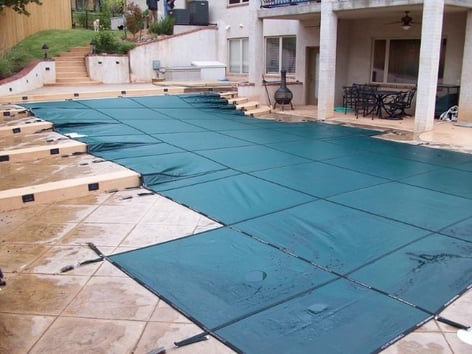Although many people think of covering a pool as part of the winterizing process, it may be that a cover is a wise investment in terms of energy savings and water conservation year round. If you don’t have a pool cover that you use during the swimming season as well as in the winter, you may want to think about investing in both.
Winter covers can help keep your water clean in the off-season and help to avoid the costly clean-up process in the spring. Solar covers (for summer use) can slow evaporation, help control chemical use, and keep your pool dust-, leaf-, and critter-free.
An in-ground safety pool cover adds the important element of safety to an in-ground pool. And, most professional installers will tell you that a cover will pay for itself in terms of dollars and add a great deal to your enjoyment and peace of mind.
(Shopping for an above ground pool? Check out our free shopping guide.)

The Case for Covers
Comparative studies in various climates prove conclusively that pool covers cut your costs dramatically. According to energy.gov, covering your pool when it is not in use is the single best way to reduce costs and conserve energy.
There are many types of pool covers available. Although it may not be recommended or even advisable in most circumstances, there are types of pool covers that are sturdy enough to walk across. Although any plastic material is technically a sufficient vapor barrier, you will most likely want to look for a cover fabricated specifically for swimming pools.
The most economical are solar covers (for use in the summer), made from a cousin of the popular packing material bubble wrap. Many of these solar covers have UV inhibitors as well. They are commonly used for above-ground pools because they are light and relatively easy to handle. Solar covers can extend a swim season by increasing the water temperature in a pool. They capture the heat from the sun and hold it in the top layer of the water, which makes a pool much more inviting at the very beginning and end of summer.
Many types of covers are available for in-ground pools, ranging from mesh-style covers to solid covers. They typically anchor to the concrete deck around the pool by hooks and straps that are sewn into the cover. In-ground covers of this nature are excellent at keeping light and organic materials such as leaves out of the pool so that algae growth is either minimal or non-existent. However, they are also a fairly expensive option.
Deciding Which Pool Cover is Right for You
The best time to think about a pool cover is, as you might expect, at the time you install the pool itself. However, if you are considering a cover for an existing pool, you still have a number of options. Your best course of action is to contact your professional pool supplier or installer.
We at Country Leisure will be happy to share our own experiences and our expertise in order to increase your “Pool IQ” and maximize your satisfaction with your pool.









.png?width=263&name=May%20%20CL%20%20(1).png)